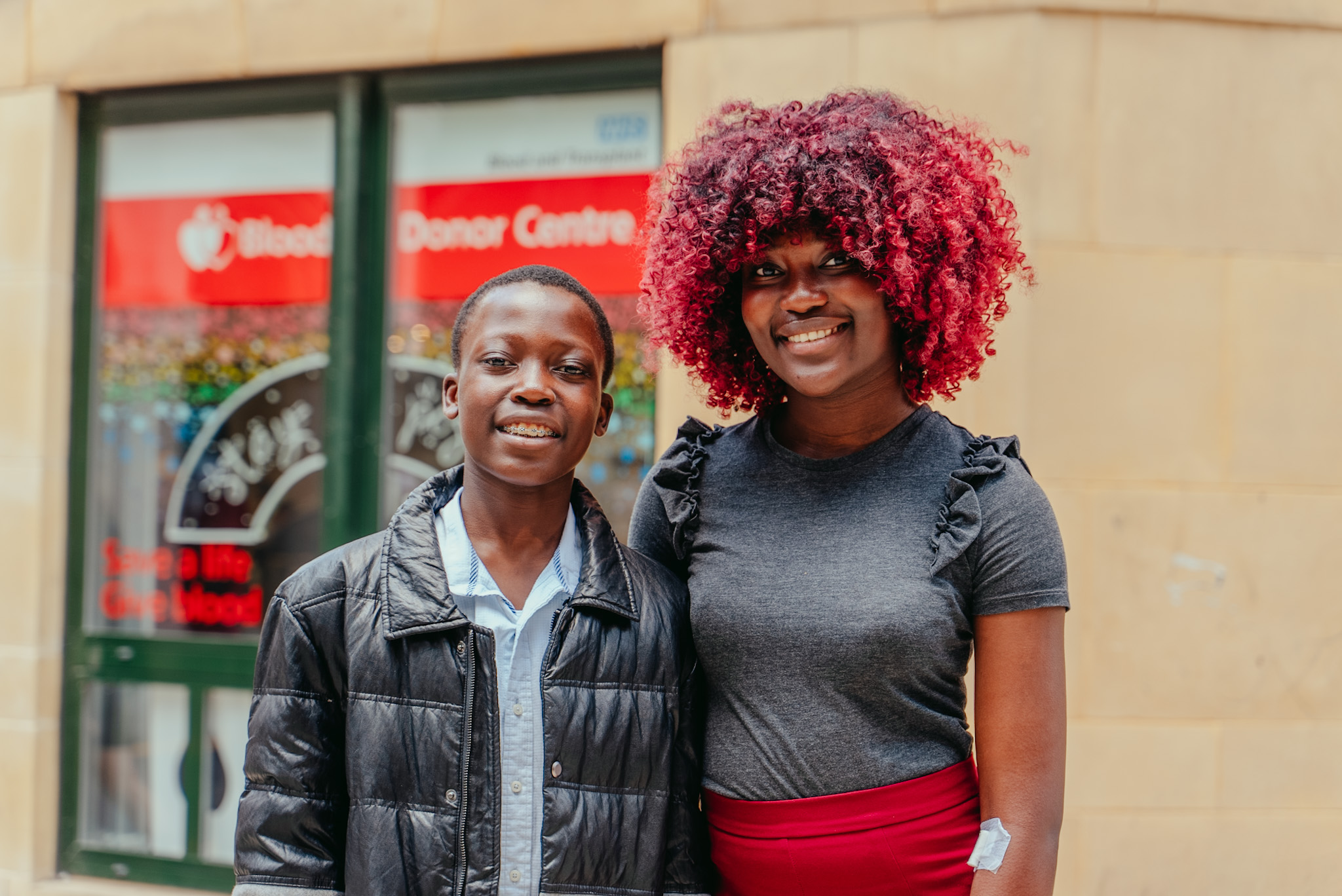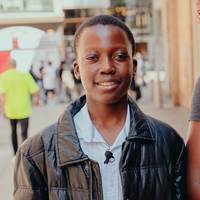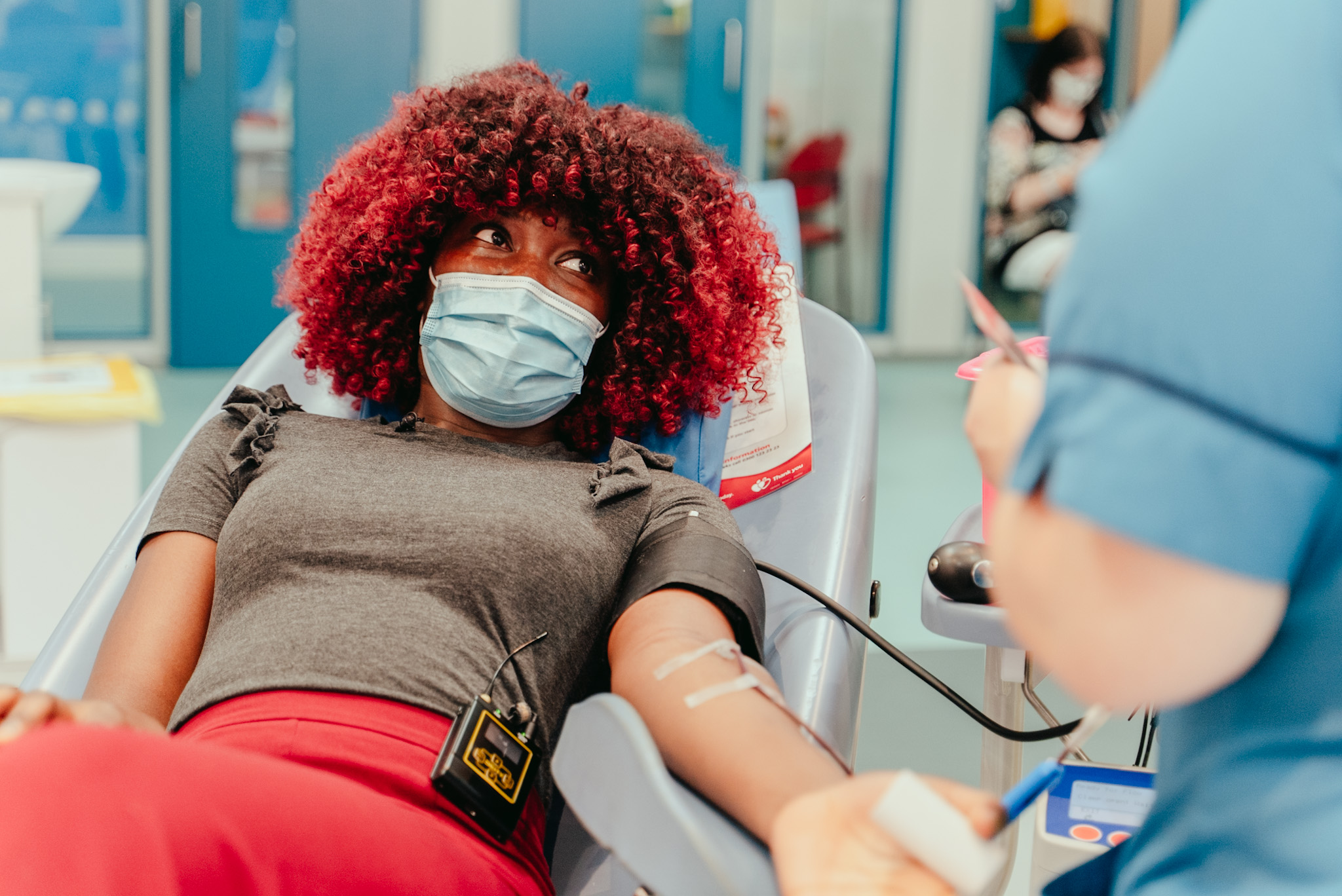Critical call for Black people to donate blood as 16,000 new donors urgently needed
The sister of a teenager with sickle cell has overcome her fear of needles and donated blood for the first time to help others like her brother who lives with the devastating impact of the blood disorder.
Zenith Seyi-Abiodun, 18, says she is giving blood to thank the blood donors who are saving her 16 year old brother Charming’s life and to encourage more Black people to help their family and the community by donating to help other sickle cell patients.

The siblings, from Gorton, in Manchester, came together for Zenith’s first blood donation in a symbolic reversal of their usual roles.
Zenith, usually at Charming’s side to support him through his regular exchange transfusions, last week swapped from the side to sitting in the chair and overcame her fear of needles to give blood, with Charming watching on in support.
NHS Blood and Transplant urgently need more Black people to give blood to address an increasing demand for Black African, Black Caribbean or mixed ethnicity donors.
This Sickle Cell Awareness Month, NHS Blood and Transplant is urging Black people to donate blood to save lives. It is safe and easy to donate and you can save up to three lives in one hour.
16,000 new donors from the Black and mixed Black communities must be recruited this year as demand rises for life-saving transfusions for people with sickle cell disease.
Sickle cell is the fastest growing genetic disorder in the UK, affecting 15,000 people with around 300 babies born with the blood disorder each year.
Each month 1,300 Black donors are needed to give blood to provide life-saving transfusions to sickle cell patients, as well as for use in emergencies, childbirth, during surgery, in cancer treatments and for us in other medical conditions.
Sickle cell is an inherited blood disorder and is more common in Black people. It can cause organ failure, stroke or loss of vision, and can be fatal.
People who are Black African, Black Caribbean and of Black mixed ethnicity are more likely to have the rare blood sub-group Ro that many Black sickle cell patients need.
Charming was diagnosed with sickle cell at birth and had his first painful episode, known as a crisis, when he was 22 months old with swollen legs and arms.
When he was five he started having more crises and doctors were concerned about his increasing risk of a stroke.
He started blood transfusions at seven years old and now has red cell exchanges every month receiving 1.5 to two pints of blood.
The blood donated has helped me to feel better every day - I am running and playing with my friends so I feel very thankful and grateful for blood donors.
Charming
16 year old living with sickle cell
Charming said: “Every day was a struggle, like a heavy load I carried around on my back.
“The fatigue, the aches and pains - it felt like my joints were rusting up.
“Now, after a blood exchange I feel good. When I am closer to my next transfusion due date I start to get tired again.
“The blood donated has helped me to feel better every day - I am running and playing with my friends so I feel very thankful and grateful for blood donors.”
Zenith was keen to give blood when she turned 18 and made her first donation on Monday 19th July at Manchester City Centre Blood Donor Centre.
Zenith, who is hoping to go Leeds University in September to study Business, said seeing her brother go through sickle cell crises as he grew up was upsetting.
She said: “He would be sick every day and couldn’t play for more than a couple of minutes, it was hard for me to understand when I was young.”
After giving blood Zenith said: “It felt really good donating, I felt amazing to be able to make a difference to someone’s life and to help people like my brother, just like other donors have been so generous to my brother.
“More Black people are needed to give blood, any of us could be in that position of needing blood.”
Charming said: “I am proud of my sister. To give blood shows kindness and love for others, to be able to help someone like me.”
There are currently 12,633 Black and mixed Black blood donors, which is around 1.5 percent of the total donor base.
Colin Anderson, Community & Engagement Lead at NHS Blood and Transplant, said: “The numbers of blood donors needed from Black African and Black
Caribbean communities show just how important our appeal is for new donors to make an appointment to give blood today.
“There are very real people behind these numbers - they are children, adults and their families who face painful struggles with life-threatening sickle cell and uncertain futures.
“But they are also the donors who are doing something amazing – giving blood takes just one hour and can save three lives.
“We know demand for Black blood donors will continue to rise as the number of people with sickle cell grows but we have a chance now to close the gap and help our friends, neighbours and communities battling this disease.”
NHS Blood and Transplant is working closely with Black communities and sickle cell groups to increase numbers of new donors and rates of donation through a variety of campaigns and events.
The number of Black donors has increased in recent years by around 29%.
Last month, on Saturday June 19th 2021 the highest number of blood donations from Black donors in a single day for 22 years was recorded – with 223 donations. The previous record was held in 1999 with 212 donations in one day.
The spike in Black donors in June accompanied a special blood donation event, which was part of the United by Blood campaign led a coalition of Black charities African Caribbean Leukaemia Trust (ACLT), Black Mums Upfront and Cell Fe For Life to encourage more Black people to donate in memory of Evan Nathan Smith, a 21-year-old man who had sickle cell anaemia.
Vaccines Minister, Nadhim Zahawi, said: “The whole country has pulled together in our shared fight against COVID-19, with communities up and down the country doing their bit to support their loved ones and their neighbours. It’s crucial we bottle this astonishing goodwill and apply it to how we approach other conditions.
“To tackle conditions like sickle cell – which is the fastest growing genetic disorder in the UK – we urgently need more blood donors to come forward, particularly from black and ethnic minority communities.
“Sickle cell and conditions like it can have a hugely detrimental impact on people’s lives, and by giving blood you could help save someone’s life. There is no better time to donate, and I urge people to do their bit by coming forward.”
Become a blood donor. Register today and book and appointment. You can also register by downloading the GiveBloodNHS app or by calling 0300 123 23 23.

